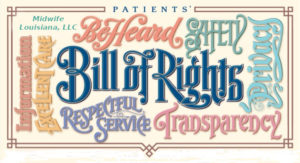Patient’s Rights…
Have you seen posted on the wall at any medical facility or office a document titled The Patient’s Bill of Rights? If so, you may recall that the first tenant is that the person being seen has the right to accurate and understandable information about their condition and any treatments that might be considered. Some Patient’s Rights, but not all, include a statement about the patient having an active role in the decision making process with regard to their care. Both of these are the essence of midwifery care in its support for bodily autonomy. Both of these are at the core of Informed Consent, also known as Informed Choice.

…is Informed Consent
There are three recognized types of Informed Consent regularly used in the midwifery community. The first is a legal document required by most states, including Louisiana, that is a blanket statement covering the midwife’s credentials, philosophy, risks and benefits of out of hospital birth, emergency transport plan, and other topics. The purpose is to inform families on what they can and cannot expect from their midwife, such as receiving ongoing education regarding the latest evidence based practices for pregnancy, and labor and delivery. The purpose is also about what the midwife expects from the family regarding their commitment to homebirth, as demonstrated by lifestyle choices. Mutually honest communication is paramount. Although not mandated in Louisiana, my informed consent includes a grievance policy in the event a family feels there has been a breech of ethics on my part.
See my general Informed Consent form for initiating midwifery care here.
Wait? There’s more than one?
The second type of Informed Consent is procedure specific. For example, standard pregnancy care offers a test for Group Beta Strep (GBS) at 36 weeks of pregnancy. Procedure specific Informed Consent gives education, usually in writing, about GBS, why we test for it, treatment options when a test is positive, treatment options when a test is refused, and documentation that the course was explained along with decisions made by the family. Ample time is given for the family to research the topic, and the final decisions made are collaborative between the family and midwife. In addition to Informed Consent empowering the family, it works as a tool for the midwife to provide individualized care. I offer Informed Consents for all screens, tests, and newborn procedures.
See an example of a procedure specific Informed Consent you might expect during midwifery care here.
There’s even more?
There are times when it is impractical for the family to take the time to research and the midwife to document Informed Consent, a medical emergency during birth being one of them. However, the family is still entitled to be treated respectfully and to be given information as to what is happening. Therefore, the third type of consent is verbal. For instance, the midwife may ask for someone to call an ambulance when she observes something beyond her skill set to manage. This is the informed part. Going to the hospital or declining to, even against the midwife’s advise, is the consent part. Documentation would take place after the fact.
Use your brain
BRAIN is an acronym that can help you remember which questions to ask for Informed Consent. It may look something like this:
Benefit – what are the benefits of the test or procedure being offered?
Risk – what are the risks of the test or procedure being offered?
Alternative – are there any alternative tests or procedures being offered?
Intuition – how do you personally feel about the test or procedure? c
Not Now – what if the test or procedure is postponed, how long can we wait?
The answers to these questions for any procedure, pregnant or not, will help you get the information you need to make a decision that works best for you and your situation.
In summary
At the heart of midwifery care is the rights of the family to have access to accurate and easy to understand information about their care, education about procedures and treatment options, and inclusion in the decisions for the course of their care. Information is given verbally and in writing. Documentation of consent is one method that helps guide the midwife in providing individualized care. For more information on how you can have an active role in your pregnancy care decisions, call or text Rebecca Honeycutt for a free consultation at (318


